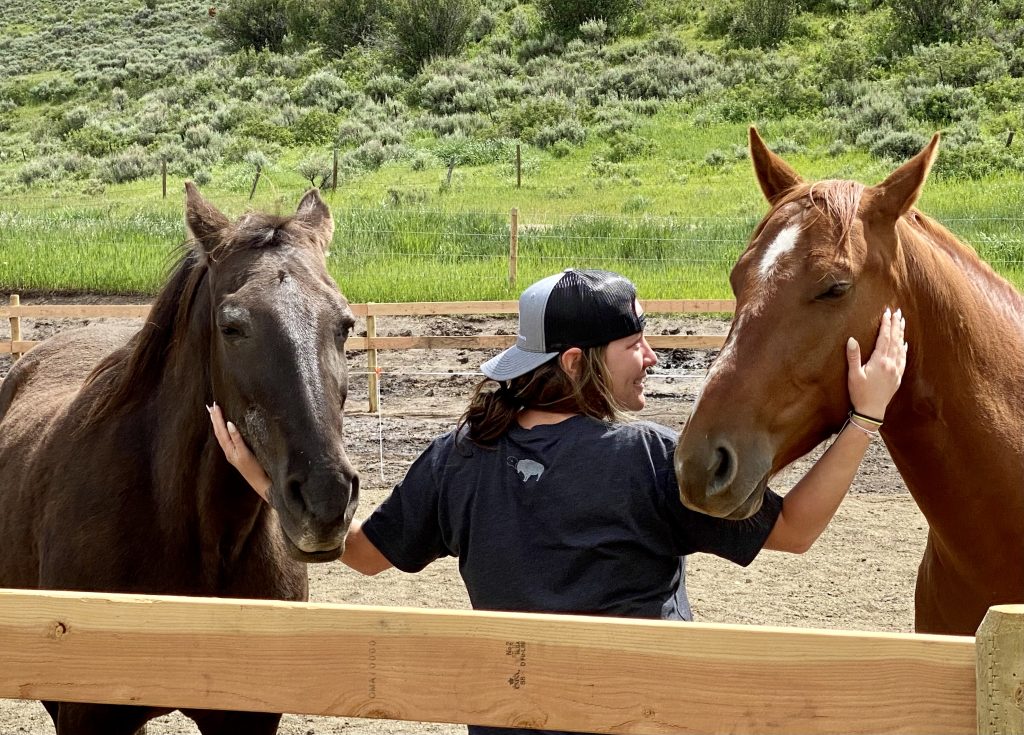Mental Health Minute: The transformative power of equine therapy for veterans facing PTSD, anxiety and depression
Mental Health Minute

Grant Alan Photography
For veterans returning from service, the transition to civilian life can be fraught with invisible battles. Post-Traumatic Stress Disorder (PTSD), anxiety and depression are common mental health challenges, often stemming from the traumas of combat and military life.
While traditional therapies such as counseling and medication are invaluable, equine-assisted intervention therapy has emerged as a powerful complementary approach with a proven history of success.
A proven modality with deep roots
Equine-assisted intervention therapy boasts nearly 60 years of history, with its origins dating back to 1960. Over six decades of research have demonstrated its significant positive impact on various psychotherapy patients (Li & & Sánchez-García, 2023). Initially used in physical rehabilitation and developmental therapies, equine-assisted therapy (EAT) has evolved into a novel auxiliary treatment method for a wide range of mental health conditions. Veterans struggling with PTSD, anxiety, and depression have found equine therapy particularly effective in fostering emotional resilience and healing.
Why horses make ideal therapeutic partners
Horses are highly intuitive animals, responding to human emotions and nonverbal cues with remarkable sensitivity. This ability allows them to act as mirrors, reflecting the emotional states of those around them.
For veterans who may find it difficult to articulate their feelings, these therapeutic interactions with horses can help them gain new perspectives and alter their behavior. The presence of a horse serves as a catalyst for the emergence of new ideas and emotions, facilitating breakthroughs that might be difficult to achieve through traditional talk therapy alone.
The benefits of equine therapy extend beyond emotional insights. Interaction with horses promotes the development of nonverbal communication skills, an essential component for veterans who may struggle to express themselves verbally.
Moreover, studies have shown that spending time with horses can lead to measurable physical benefits, including reduced blood pressure, lower heart rates and decreased anxiety levels.
Healing through connection and crust
One of the primary hurdles veterans face is rebuilding trust — both in themselves and in others. Equine therapy provides a safe space for this process.
Horses, being non-judgmental and living entirely in the moment, require calm, consistent leadership. Veterans quickly learn that to gain a horse’s trust, they must regulate their own emotions and behavior.
This process not only fosters a sense of control and self-awareness but also mirrors the interpersonal skills necessary for healthy relationships outside the therapeutic setting.
Through grooming, leading, and being in their presence, veterans build a connection based on mutual respect and trust. This bond often becomes a foundation for broader emotional healing, helping veterans reconnect with their families, friends and communities.
Wide-ranging mental health benefits
Equine-assisted therapy has been shown to effectively treat not only PTSD, anxiety, and depression but also a wide range of other mental health conditions. Research indicates its efficacy in addressing attention deficit/hyperactivity disorder (ADHD), conduct disorder, dissociative disorders, Alzheimer’s disease, dementia, autism, and various other chronic mental illnesses (Li & & Sánchez-García, 2023).
This versatility highlights the profound impact that equine therapy can have across different populations, with veterans benefiting significantly from its holistic approach.
Building community and purpose
Beyond the individual benefits, equine therapy can often take place in group settings, fostering a sense of camaraderie among veterans. Sharing the therapeutic journey with peers who understand the unique challenges of military life can be incredibly validating and supportive.
Additionally, the act of caring for another living being provides veterans with a renewed sense of purpose, which is often missing after leaving the structured environment of military service.
A path to empowerment and healing
Equine therapy offers veterans more than symptom relief — it provides a path to empowerment. By engaging with horses, veterans learn to navigate their emotional landscapes, build resilience, and regain control over their lives. The lessons learned in the arena often extend far beyond the ranch, equipping veterans with the tools they need to lead fulfilling, empowered lives.
For veterans battling PTSD, anxiety, and depression, equine therapy offers a transformative journey toward healing — one step, one breath and one hoofbeat at a time.
Li, J., & Sánchez-García, R. (2023). Equine-assisted interventions for veterans with posttraumatic stress disorder: a systematic review. Frontiers in psychiatry, 14, 1277338. https://doi.org/10.3389/fpsyt.2023.1277338

Support Local Journalism

Support Local Journalism
Readers around Steamboat and Routt County make the Steamboat Pilot & Today’s work possible. Your financial contribution supports our efforts to deliver quality, locally relevant journalism.
Now more than ever, your support is critical to help us keep our community informed about the evolving coronavirus pandemic and the impact it is having locally. Every contribution, however large or small, will make a difference.
Each donation will be used exclusively for the development and creation of increased news coverage.









